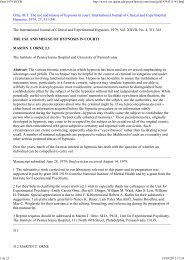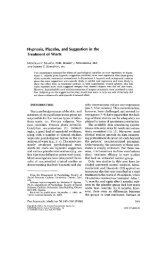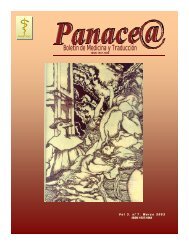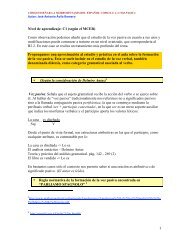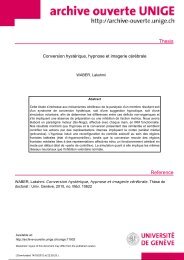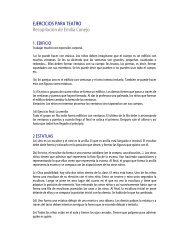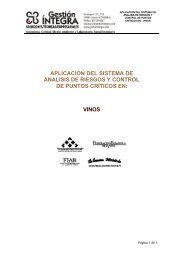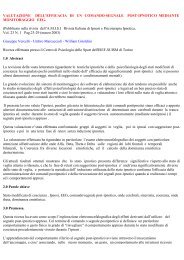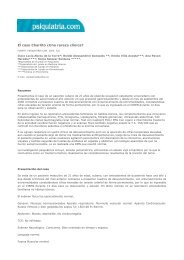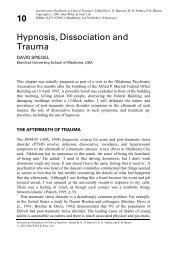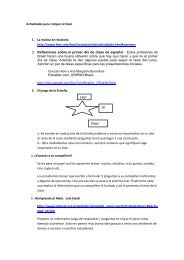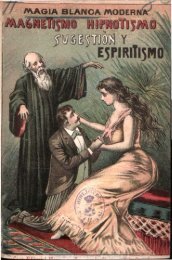Diccionario etimológico comparado de la lengua castellana
Diccionario etimológico comparado de la lengua castellana
Diccionario etimológico comparado de la lengua castellana
Create successful ePaper yourself
Turn your PDF publications into a flip-book with our unique Google optimized e-Paper software.
GALLO GALLÓ 2731<br />
CUBRIÓ EL CUCHILLO, ref. que manifiesta que<br />
los que andan averiguando lo que no les importa,<br />
suelen <strong>de</strong>scubrir lo que no quisieran.—<br />
GALLO QUE NO CANTA, ALGO TIENE EN LA GAR»<br />
GANTA. ref. que advierte que, cuando uno <strong>de</strong>ja<br />
<strong>de</strong> terciar en conversaciones que le atañen,<br />
suele consistir en que algo tiene que temer.<br />
HACERSE uno EL GALLO, fr. fig. y fam. Ser el<br />
primero en autoridad, aprecio ó saber en una<br />
comunidad ó junta.— IR Á escucha gallo, fr.<br />
fig. y fam. Ir con cuidado y atención, observando<br />
si se oye alguna cosa.—metí gallo en<br />
MI cillero, HÍZOSE MI HIJO Y MI HEREDEHO.<br />
ref. que se dice <strong>de</strong>l que voluntariamente recibe<br />
á uno en su casa, el cual luego, por fuerza<br />
'^K ó maña, se hace dueño <strong>de</strong> el<strong>la</strong>— otro gallo<br />
^r ME. TE, LE, NOS, OS, LES, CANTARA, expr. fig.<br />
y fam. Mejor sería mi, tu, su, nuestra, vuestra,<br />
suerte, oyó al gallo cantar, y no supo<br />
EN QUÉ mu<strong>la</strong>dar, ref. con que se zahiere<br />
al que oye mal. ó entien<strong>de</strong> mal lo que oye.—<br />
SER uno EL gallo, fr. fig. y fam. hacerse<br />
EL GALLO.—TENER unO MUCHO GALLO, fr. fig.<br />
y fam. Tener soberbia, altanería ó vanidad, y<br />
afectar superioridad ó dominio.<br />
Gallo-cresta, f.<br />
Gfr. etim. gallo y cresta.<br />
SIGX.— I. P<strong>la</strong>nta medicinal, especie <strong>de</strong> salvia,<br />
con <strong>la</strong>s hojas obtusas, festoneadas y <strong>de</strong><br />
figura algo semejante á <strong>la</strong> cresta <strong>de</strong>l gallo, el<br />
tallo anguloso y como <strong>de</strong> medio metro <strong>de</strong> alto,<br />
y <strong>la</strong> flor encarnada.<br />
2. P<strong>la</strong>nta herbácea <strong>de</strong> <strong>la</strong> familia <strong>de</strong> <strong>la</strong>s<br />
escrofu<strong>la</strong>riáceas, con tallo <strong>de</strong>recho, sencillo ó<br />
ramoso; hojas <strong>la</strong>nceo<strong>la</strong>das, acorazonadas en <strong>la</strong><br />
base, aserradas por el margen y flores amarillentas<br />
en espiga :<br />
La doméstica es esta, que damos pintada, y por <strong>la</strong><br />
salvage, con muchos varones doctos, entiendo <strong>la</strong> gallocresta.<br />
Lag Diosc. lib. 3. cap. 139.<br />
Gall-ofa. f.<br />
ETIM.— «El mendrugo <strong>de</strong> pan, que<br />
se daba á aquellos pobres que venian<br />
<strong>de</strong> <strong>la</strong> Francia, y passaban pidiendo limosna<br />
á Santiago <strong>de</strong> Galicia. Trabe esta<br />
voz Covarr. y <strong>la</strong> explica assí en <strong>la</strong> pa<strong>la</strong>bra<br />
Gallofo, y dice que vale quasi<br />
Galli o/a, mendrugo ó sopa <strong>de</strong>l pobre<br />
francés». íAcad. Dicción. Edición <strong>de</strong><br />
1734). Derívase pues <strong>de</strong> Galli (gen.),<br />
cuya etim. cfr. en galo, gálico, etc., y<br />
ofá <strong>de</strong>l <strong>la</strong>t. offa, masa <strong>de</strong> harina, cocida<br />
como torta; pelota á modo <strong>de</strong> albóndiga,<br />
hecha <strong>de</strong> pan, carne y otros ingredien-<br />
tes, etc. Derívase of-f-a <strong>de</strong>l prim. *of-a<br />
(por duplicación <strong>de</strong> <strong>la</strong> -/-, según se<br />
advierte en el diminuí, of-el<strong>la</strong>, pedazo<br />
pequeño <strong>de</strong> carne); cuya raíz of-, correspondiente<br />
á <strong>la</strong> grg. bf- (cfr. of-sX-o?,<br />
utilidad, provecho), <strong>de</strong> <strong>la</strong> primitiva opy<br />
ésta <strong>de</strong> ap-, anudar, atar, en<strong>la</strong>zar,<br />
ligar; conseguir, alcanzar, lograr, impe-<br />
trar, ganar; poseer, gozar, obtener, etc.,<br />
—<br />
y su aplicación cfr. en op-tar, óp-timo,<br />
etc. ICtimológ. significa <strong>la</strong> que se apetece,<br />
se logra; <strong>la</strong> que se consigue, eic. Díjose<br />
así, porque <strong>la</strong> offh era en principio una<br />
albóndiga, una masa apetecida, <strong>de</strong>seada,<br />
solicitada. Derívanse <strong>de</strong> gallo-fa:<br />
gallof-ar, gallof-ear, gall-ofo, ga-<br />
LL-OF-ERO, etc. Cfr. i tal. gaglioffo; wal.<br />
galofa, gaioufe ; lomb. gajoffa; catalán<br />
galy-ófol (=galli ojfu<strong>la</strong>j, etc. Cfr. apto,<br />
CÓPULA, etc.<br />
SIGN.— 1. Comida que se daba á los pobres<br />
que venian <strong>de</strong> Francia á Santiago <strong>de</strong> Ga<strong>la</strong>cia<br />
pidiendo limosna.<br />
2. Verdura ú hortaliza que sirve para ensa<strong>la</strong>da,<br />
menestras v otros usos :<br />
Y no hal<strong>la</strong>ndo gallofa en <strong>la</strong>s huertas, recurrían á los<br />
campos y á <strong>la</strong>s hierbas sylvestres. Nier. Dif. lib. 3,<br />
cap 7, § 3. .<br />
3. Cuento <strong>de</strong> poca substancia, chisme.<br />
4-. Bollo <strong>de</strong> pan francés.<br />
5. AÑALEJO.<br />
Gallof-ar. n.<br />
:<br />
Cfr. etim. gallofo. Suf. -ar.<br />
SIGN.— ant. gallofear. *<br />
Gallof-ear. n.<br />
Cfr. etim. gallofo. Suf. -ear.<br />
SIGN.— Pedir limosna, viviendo vaga y ociosamente,<br />
sin aplicarse á trabajo ni ejercicio<br />
alguno.<br />
Gallof-ero, era. adj.<br />
Cfr. etim. gallofa. Suf.<br />
SIGN. — Pohretón, holgazán<br />
-ero.<br />
y vagabundo,<br />
que se da á <strong>la</strong> briba y anda pidiendo limosna.<br />
Ú. t. e. s.<br />
Tq bel<strong>la</strong>co y gallofero eres,<br />
sirvas. Lazar. Torm. cap. 3-<br />
busca un amo á quien<br />
Gall-ofo, ofa. adj.<br />
Cfr. etim. gallofa.^<br />
SIGN.— GALLOFERO. Ú. t. C. S.<br />
Gall-6n. m.<br />
ETIM. — Del bajo-<strong>la</strong>t. cap-u-lus, cortado,<br />
( <strong>de</strong>riv. <strong>de</strong> capus, capón, castrado);<br />
<strong>de</strong>l cual <strong>de</strong>scien<strong>de</strong> el bajo-<strong>la</strong>t. capul-are,<br />
cortar, <strong>de</strong>spedazar ; cuya raíz y sus<br />
aplicaciones cfr. en capo<strong>la</strong>r, capar,<br />
CACHO y GAJO. Etimol. significa cortado,<br />
<strong>de</strong>spedazado. Díjose así porque el gallón<br />
es el césped que se arranca <strong>de</strong> los<br />
prados con una pa<strong>la</strong> <strong>de</strong> acero; el césped<br />
arrancado en pedas os. De cap-ulus<br />
formóse cap'lus ( cfr. gajo y cacho ) y<br />
luego *CALLo, prim. <strong>de</strong> gall-ón. Para<br />
el cambio <strong>de</strong> c- en g- cfr. gajo y para<br />
el <strong>de</strong> -pl- en -//- cfr. e-scollo, <strong>de</strong>l <strong>la</strong>t.<br />
*scop'lus, <strong>de</strong> scopulus. Cfr caponera,<br />
caponar, etc.<br />
SIGN.—TEPE.



